|
|
|
Sort Order |
|
|
|
Items / Page
|
|
|
|
|
|
|
| Srl | Item |
| 1 |
ID:
121439
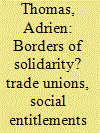

|
|
|
|
|
| Publication |
2013.
|
| Summary/Abstract |
This article explores the effects of borders on the making of trade union policies and on their capacity to act. It takes as an entry-point the reform of Luxembourg's system of family allowances and financial support for students in 2010, which redefined the group of beneficiaries and partly excluded cross-border workers from neighbouring countries. This led to heated debates in Luxembourg and in the Greater Region (comprising Luxembourg, Saarland, Rhineland-Palatinate, Lorraine and Wallonia) during which trade unions played an important part. The author explores the contradictory logics of both competition and cooperation within the Greater Region. These lead to a gap between integration as a discourse and what it means for local populations, in particular regarding labour market competition. The debates within trade unions on the issue of social entitlements for cross-border workers offer insights into the dynamics of this dichotomy and into the everyday fabric of cross-border social relations.
|
|
|
|
|
|
|
|
|
|
|
|
|
|
|
|
| 2 |
ID:
121440
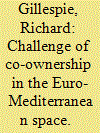

|
|
|
|
|
| Publication |
2013.
|
| Summary/Abstract |
The European Union's recent experimentation with forms of partnership and co-ownership has found its most ambitious expression in its southern neighbourhood in the form of the Union for the Mediterranean (UfM). Initially pioneered by Nicolas Sarkozy in an attempt to reaffirm a leading role for France within Europe, the experiment has foundered on the difficulty of creating effective governance structures in a Euro-Mediterranean space noted for geopolitical complexity, uncertain and shifting boundaries and cultural hybridity. The UfM experience illustrates how region-building can regress when its focus area becomes too extended and overambitious or inappropriate forms of institutionalisation are attempted. Yet, once offered to partners, co-ownership may be difficult to retreat from. The EU has side-stepped the UfM in its initial response to the Arab Spring, but the latter itself may bring southern demands for more effective co-ownership in future regional cooperation frameworks.
|
|
|
|
|
|
|
|
|
|
|
|
|
|
|
|
| 3 |
ID:
121436
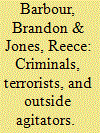

|
|
|
|
|
| Publication |
2013.
|
| Summary/Abstract |
This article is a critical geopolitical analysis of Chinese media representations of the 5 July 2009 riots in Xinjiang, China. Significant events often define the geopolitical climate by creating a space for the construction of boundaries between identity categories and the appropriate norms for behaviour towards the Other. The post-riot reports framed the event through the prism of the global war on terror to justify a violent response to protect Chinese citizens from the perceived threat of the Other. After connecting theories of narratives, the event, and group making, the article identifies three representational tropes - the criminal, the terrorist, and the outside agitator - in Chinese documents that create boundaries between the identity categories Uyghur and Han and define how the Other should be treated. The three representation tropes of the Other in the aftermath of the 5 July riots simultaneously situate the protestors as outside Chinese society and perpetuate the claim of the superiority of Chinese culture and civilisation.
|
|
|
|
|
|
|
|
|
|
|
|
|
|
|
|
| 4 |
ID:
121432
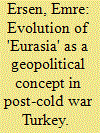

|
|
|
|
|
| Publication |
2013.
|
| Summary/Abstract |
This article aims to discuss and analyse the major factors behind the emergence and evolution of "Eurasia" as a geopolitical concept in Turkey in the post-Cold War period. For this purpose, special focus will be placed on Turkish political, academic and intellectual circles' redefinition of their geopolitical outlook towards Russia and the Turkic republics of Central Asia and Caucasus in the 1990s and 2000s. The major argument of the article in this regard is that while discourses such as Pan-Turkism, Eurasianism and Neo-Ottomanism have exercised a degree of influence over the conceptualisation of Eurasia in Turkish academic and intellectual circles, the concept has been generally treated as an instrument of pragmatism by Turkish policymakers. This pragmatism is not only reflected in their geo-economic calculations in the field of energy pipelines, but also the reasoning behind the striking improvement of political and economic relations between Turkey and Russia in the 2000s.
|
|
|
|
|
|
|
|
|
|
|
|
|
|
|
|
| 5 |
ID:
121437


|
|
|
|
|
| Publication |
2013.
|
| Summary/Abstract |
This article makes a methodological argument about 'studying up' in foreign policy bureaucracies. Although recent years have witnessed a growing interest in ethnography across the social sciences, including the study of foreign policy and diplomacy, theoretical reflections on the methodology as such greatly outnumber those that actually attempt ethnographic accounts of foreign policy institutions. This imbalance results in large part from the difficulty of fieldwork in these settings. Drawing on six years of research on EU external relations, including 105 interviews with foreign policy professionals, this article lays out some of the difficulties and thereby clarifies the benefits and costs of such fieldwork. More broadly, the article highlights some of the methodological challenges in interpretative research inside the institutions of foreign policy. My concern is not with ethnography or foreign policy as such; I rather examine the specific challenges of conducting fieldwork informed by ethnographic methodology inside foreign policy bureaucracies. The article advises caution about the ever-widening use of the term 'ethnography' in the study of policy.
|
|
|
|
|
|
|
|
|
|
|
|
|
|
|
|
| 6 |
ID:
121434
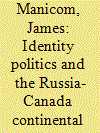

|
|
|
|
|
| Publication |
2013.
|
| Summary/Abstract |
The geopolitics of the Arctic region is viewed as a race for resources between coastal states. Yet, alarmist assessments are tempered by the reality that the most economically viable hydrocarbon reserves are entirely contained within the uncontested EEZs of the littoral states. Given this situation, confrontational rhetoric coming from Ottawa and Moscow seems not only troubling but peculiar. This article attempts to explain this peculiarity. It argues that leaders in both states seem willing to emphasise the ideational salience of disputed space to domestic audiences while downplaying their cooperative track record. The article finds mixed evidence of the instrumental use of national identity politics in Arctic issues, which often conflate distinct elements of Arctic geopolitics. While this dynamic has not yet prevented cooperation over disputed boundaries, perpetuation of these narratives may erode domestic support for dispute settlement.
|
|
|
|
|
|
|
|
|
|
|
|
|
|
|
|
| 7 |
ID:
121441
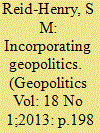

|
|
|
|
|
| Publication |
2013.
|
| Summary/Abstract |
This paper develops a critique of the emergence of the new European Border Agency, Frontex, specifically its operations along Europe's maritime borders with North Africa. Rather than account for Frontex in terms of securitising and neoliberalising processes, as has become common, I focus instead on the underlying geopolitical rationalities that guide Frontex operations. These reflections then set up the further argument of the paper: that what Frontex itself sheds light upon is a novel geopolitics of the border, what can be thought of as an 'incorporating geopolitics'. Through investigation of the policies and practices of Frontex, such an incorporating geopolitics can be shown to be replacing the much-discussed paradox of contemporary border regimes - that between trade freedoms and security restrictions - with a more fundamental contradiction: that the more border controls address more than just borders, the more they may themselves undermine the societies they purport to protect.
|
|
|
|
|
|
|
|
|
|
|
|
|
|
|
|
| 8 |
ID:
121433
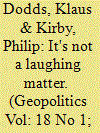

|
|
|
|
|
| Publication |
2013.
|
| Summary/Abstract |
This paper explores the possibilities of considering humour and laughter as a serious matter of concern for critical geopolitics and political geography more generally. While there has been some interest in this topic, there is scope to devise a more expansive research agenda. Using both laughter and Michael Billig's notion of unlaughter, the paper considers how these visceral expressions contribute, often in subtle ways, to the making of geopolitical subjectivities. The final part of the paper considers some possibilities for future research.
|
|
|
|
|
|
|
|
|
|
|
|
|
|
|
|
| 9 |
ID:
121438


|
|
|
|
|
| Publication |
2013.
|
| Summary/Abstract |
This article introduces the study of photographs of politicians as an object of geopolitical analysis. It does this through exploring the holiday photographs of Vladimir Putin released by the Kremlin in 2007, 2009, and 2010. Putin's biography provides a backdrop to a detailed analysis of the geopolitical representations contained in the photographs of him. In the same fashion as other images, the photographs seek to provide a contemporary view of events and, at the same time, serve as a medium through which particular political scripts are narrated. The photographs also help to reproduce (and question) hegemonic discourses about public forms of masculinity in Russia. This article is intended to contribute to the debate on how visual images can help make sense of the geopolitical world.
|
|
|
|
|
|
|
|
|
|
|
|
|
|
|
|
| 10 |
ID:
121431
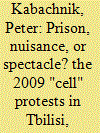

|
|
|
|
|
| Publication |
2013.
|
| Summary/Abstract |
For over three months in 2009 demonstrations took place in front of the Georgian Parliament on Rustaveli Avenue in Tbilisi, the capital of the Republic of Georgia. The protest involved a unique production of urban space as makeshift prison "cells" were placed in the landscape. The cells emerged following calls by the host of a popular reality television show, Cell #5. In order to illustrate the multiple meanings that people have of terrains of resistance, I highlight three dominant associations that people attributed to the cells: the prison metaphor; a public nuisance; and a spectacle. This case clearly exemplifies how popular culture will not only impact people's geopolitical understandings of the world but can directly alter the landscape and transform and encourage oppositional politics in a direct and immediate manner.
|
|
|
|
|
|
|
|
|
|
|
|
|
|
|
|
| 11 |
ID:
121442
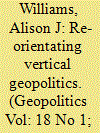

|
|
|
|
|
| Publication |
2013.
|
| Summary/Abstract |
Geopolitics has a tradition of adopting a downward looking view-from-above, which is imbued with an imperialistic 'god's eye' perspective. Although acknowledged and critiqued, this paper argues that it needs to be actively re-orientated to encompass the discourses and practices of looking up. The paper analyses the practices of looking up and surveilling the sky through which air defence is achieved. It interrogates the ways in which UK air defence is represented in official documents and analyses the activities of the Royal Air Force's Air Surveillance and Control System. The paper argues that this system enacts a vertical geopolitics that goes beyond those understood in other geopolitical literatures and offers suggestions for developing our understandings of a volumetric vertical geopolitics that recognises the aerial view as generated from below as well as from above.
|
|
|
|
|
|
|
|
|
|
|
|
|
|
|
|
| 12 |
ID:
121435


|
|
|
|
|
| Publication |
2013.
|
| Summary/Abstract |
This paper focuses on the Finnish Border Guard, a professional law enforcement authority responsible for the control and surveillance of the Finnish and Schengen borders, and its performances of border security. Performativity approach means that the analysis of the material, consisting of the bulletins and reports that have been published by the Border Guard service, is not merely focused on the representation of borders but the bulletins themselves are understood as performances of border security. The paper argues that new technological innovations, together with new legislation and institutional procedures, now steering the governance of the Finnish/Schengen border, are bound up with a new culture of border management in which border security is not (just) conceptualised in terms of territorial sovereignty but in terms of international cooperation, prevention and economic profitability.
|
|
|
|
|
|
|
|
|
|
|
|
|
|
|
|
|
|
|
|
|